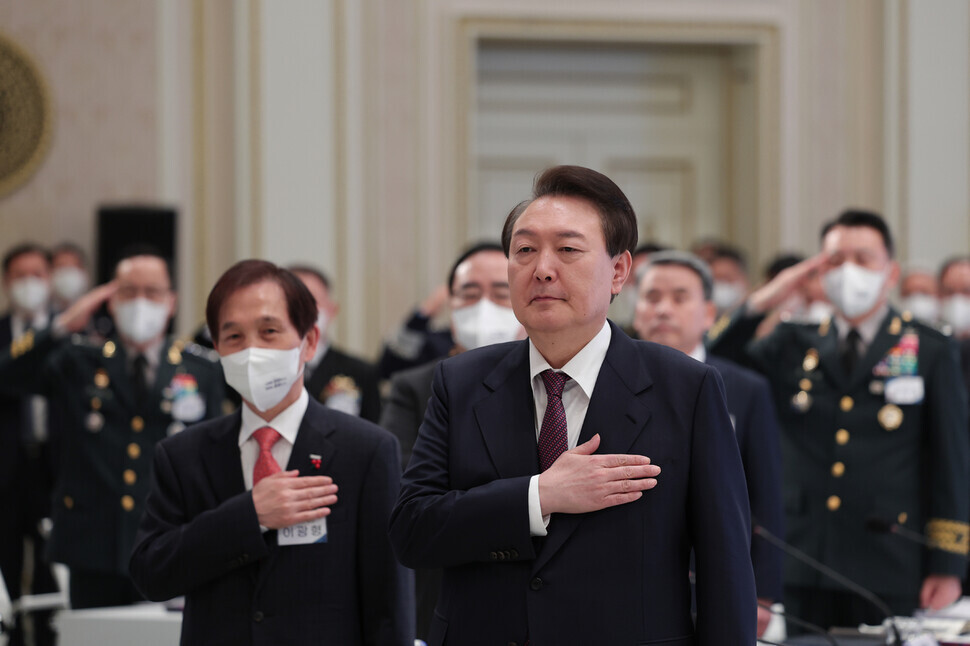hankyoreh
Links to other country sites 다른 나라 사이트 링크
S. Korean president raises eyebrows with seeming approval of Japan’s security strategy

Recent remarks made by President Yoon Suk-yeol hinting at support for Japan’s new National Security Strategy are causing a stir.
Regarding the Japanese government’s decision to increase defense spending, Yoon said on Wednesday that “with missiles flying overhead and the [possibility of] nuclear weapons [being used by North Korea], it’s not easy to stop all of that.”
Yoon made the comments during his closing remarks at the Blue House guesthouse on Wednesday after he and other officials received briefings from the Ministry of Foreign Affairs and Ministry of National Defense.
“Didn’t Japan decide to increase its defense spending and include the so-called counterattack option in its defense plan because of IRBMs flying overhead? Who would say anything about that?” the president asked, referring to intermediate-range ballistic missiles launched by North Korea.
Last month, the Japanese government announced a new National Security Strategy that includes the acquisition of “enemy base strike capabilities,” which would allow Japan to launch direct strikes against missile bases in North Korea or China in the event of an emergency. In addition, Tokyo also announced an increase in its defense spending of 2% of its GDP in the next five years.
During his speech, president Yoon repeatedly ordered the military to adopt a firm response to North Korea’s nuclear and missile provocations.
“The most important thing in the three-axis system is KMPR,” referring to Korea Massive Punishment and Retaliation.
“If we have this capability and don’t neglect [military] training, then it will be difficult for North Korea to launch an attack,” Yoon said.
“We need to completely suppress [North Korea’s] provocation mentality itself by solidifying KMPR,” the president added.
“The most important way to prevent an attack is to firmly establish a massive punishment and retaliation capability that [allows us to] strike 100 or 1000 times harder in case we do suffer an attack,” Yoon said.
“The right to self-defense against provocations must be exercised resolutely. It is necessary to respond several or even dozens of times in order to effectively exercise the right to self-defense,” the president argued.
“It is not easy for North Korea to wage a long-term all-out war like the war in Ukraine,” Yoon said. “There will be a lot of unexpected soft terrorism that will disturb and politically shake our society,” the president added, possibly bearing in mind the recent incident of a North Korean drone infiltrating South Korean airspace.
As for how to respond to the North Korean nuclear issue, Yoon emphasized that a joint nuclear planning and implementation policy with the US fits the common security interests of both Seoul and Washington.
“If the problem becomes more serious, South Korea could have tactical nuclear weapons deployed or secure its own nuclear weapons,” the president said, adding that “if things turn out this way, we will be able to acquire [nuclear weapons] quickly thanks to our science and technological capabilities.”
To this point, Yoon added that it is, however, important to choose methods that are realistically possible.
“Right now, discussions are taking place between South Korea and the US regarding the sharing of information, joint participation, joint planning, and joint execution.”
Besides this, Yoon also criticized the former Moon Jae-in administration's North Korea policy stance, saying, “We must completely distance ourselves from the kind of peace that relies on the goodwill of the other party, such as [talk of] an end of war declaration, and [instead] must be fully prepared.”
He asked those present to adequately change their way of thinking in order for “effective war preparation exercises” to be conducted “systematically and effectively.”
By Kim Mi-na, staff reporter
Please direct questions or comments to [english@hani.co.kr]

Editorial・opinion
![[Guest essay] The real reason Korea’s new right wants to dub Rhee a founding father [Guest essay] The real reason Korea’s new right wants to dub Rhee a founding father](https://flexible.img.hani.co.kr/flexible/normal/500/300/imgdb/original/2024/0423/8317138574257878.jpg) [Guest essay] The real reason Korea’s new right wants to dub Rhee a founding father
[Guest essay] The real reason Korea’s new right wants to dub Rhee a founding father![[Column] ‘Choson’: Is it time we start referring to N. Korea in its own terms? [Column] ‘Choson’: Is it time we start referring to N. Korea in its own terms?](https://flexible.img.hani.co.kr/flexible/normal/500/300/imgdb/original/2024/0423/3617138579390322.jpg) [Column] ‘Choson’: Is it time we start referring to N. Korea in its own terms?
[Column] ‘Choson’: Is it time we start referring to N. Korea in its own terms?- [Editorial] Japan’s rewriting of history with Korea has gone too far
- [Column] The president’s questionable capacity for dialogue
- [Column] Are chaebol firms just pizza pies for families to divvy up as they please?
- [Column] Has Korea, too, crossed the Rubicon on China?
- [Correspondent’s column] In Japan’s alliance with US, echoes of its past alliances with UK
- [Editorial] Does Yoon think the Korean public is wrong?
- [Editorial] As it bolsters its alliance with US, Japan must be accountable for past
- [Guest essay] Amending the Constitution is Yoon’s key to leaving office in public’s good graces
Most viewed articles
- 1Samsung barricades office as unionized workers strike for better conditions
- 2[Editorial] Japan’s rewriting of history with Korea has gone too far
- 3[Column] The clock is ticking for Korea’s first lady
- 4[Column] The president’s questionable capacity for dialogue
- 5[Reporter’s notebook] Did playing favorites with US, Japan fail to earn Yoon a G7 summit invite?
- 6Korean government’s compromise plan for medical reform swiftly rejected by doctors
- 7Why Korea shouldn’t welcome Japan’s newly beefed up defense cooperation with US
- 8Senior doctors cut hours, prepare to resign as government refuses to scrap medical reform plan
- 9[Column] ‘Choson’: Is it time we start referring to N. Korea in its own terms?
- 10[Guest essay] The real reason Korea’s new right wants to dub Rhee a founding father